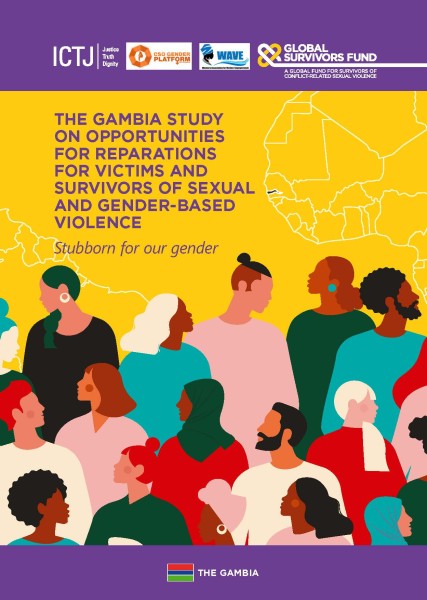We work side by side with victims to obtain acknowledgment and redress for massive human rights violations, hold those responsible to account, reform and build democratic institutions, and prevent the recurrence of violence or repression.
Stubborn for Our Gender: The Gambia Study on Opportunities for Reparations for Victims and Survivors of Sexual and Gender-Based Violence
This report presents findings from research on the needs and expectations of survivors of sexual and gender-based violence in The Gambia. Based on focus group discussions with survivors and other stakeholders, it analyses obstacles to, as well as opportunities to improve, survivors’ access to justice and reparations. It urges all relevant actors, including the Gambian government, to establish and implement a national, comprehensive, gender-sensitive, and victim-centered reparations program.

This report presents findings from a study conducted by ICTJ, the Women’s Association for Women Empowerment, and the Gender Platform for Transitional Justice, in collaboration with the Global Survivors Fund, to identify and assess the needs of survivors of sexual and gender-based violence (SGBV) committed in The Gambia during regime of former dictator Yahya Jammeh. It is based on testimony from survivors and other stakeholders gathered during focus group discussions conducted in five regions where human rights violations were committed. It summarizes the painful experiences of several survivors.
The report analyses survivors’ current needs as well as their expectations for the transitional justice and reparations process underway in the country. It explores the various challenges (legal, institutional, and social) that should be considered when designing a gender-sensitive reparations program in a context marked by pervasive patriarchy. It assesses the legal and administrative remedies in place in The Gambia for rewarding reparations to survivors of SGBV, including those provided for through the Truth, Reconciliation and Reparations Commission. Finally, the report urges all relevant actors, including the Gambian government, to establish and implement a national, comprehensive, gender-sensitive, and victim-centered reparations program that addresses the diverse and systemic challenges that survivors of SGBV face. It offers context-specific recommendations to guide the Gambian government, national and international policymakers, and practitioners as they advance such a program.